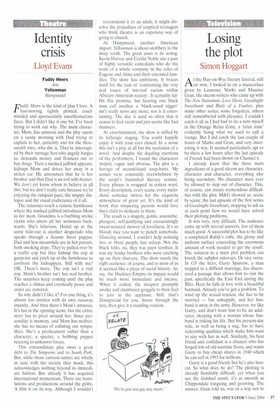Identity crisis
Lloyd Evans
Fuddy Meers Arts Yellowman Hampstead Fddy Meers is the kind of play I love. A ast-moving, tightly plotted, cruelminded and spectacularly unselfconscious farce. But I didn't like it one bit. I've been trying to work out why. The main character, Mom, has amnesia and the play opens on a sunny morning with Dad trying to explain to her, patiently and for the thousandth time, who she is. They're interrupted by their teenage Son who angrily barges in, demands money and flounces out to buy drugs. Then a masked jailbird appears, kidnaps Mom and drives her away in a stolen car. He announces that he is her brother and that Dad is an evil wife-beater. We don't yet know whom to believe in all this, but we don't really care because we're enjoying the rampant pace, the snappy dialogue and the visual exuberance of it all.
The runaways reach a remote farmhouse where the masked jailbird introduces Mom to her mom. Grandma is a burbling stroke victim who utters all her sentences backwards. She's hilarious, Holed up at the same hide-out is another desperado who speaks through a Sesame Street puppet. Dad and Son meanwhile are in hot pursuit, both smoking dope. They're pulled over by a traffic cop but they kidnap the cop at gunpoint and pitch up at the farmhouse to confront the kidnappers. Still with me? OK. There's more. The cop isn't a real cop. Mom's brother isn't her real brother. The surprises keep coming until the play reaches a climax and eventually peace and order are restored.
So why didn't I like it? For one thing, it's almost too smitten with its own runaway insanity. And then there's Mom's amnesia. It's fun in the opening scene, but the entire story has to pivot around her. Since personality is memory, and Mom has neither, she has no means of enlisting our sympathies. She's a predicament rather than a character, a spectre, a bobbing puppet reacting to unknown forces.
This extraordinary play owes a great debt to The Simpsons and to South Park. But, while those cartoon satires are wholly in tune with the society they mock, this acknowledges nothing beyond its immediate habitat. But already it has acquired international momentum. There are translations and productions around the globe. A film is on its way. Although I wouldn't
recommend it to an adult, it might dissolve the prejudices of sceptical teenagers who think theatre is an expensive way of going to church.
At Hampstead, another American import. Yellowman is about snobbery in the deep south. The great asset is its acting. Kevin Harvey and Cecilia Noble are a pair of highly versatile comedians who do the work of a whole company in the roles of Eugene and Alma and their extended families. The show has ambitions. It braces itself for the task of 'confronting the very real issues of internal racism within African-American society'. It certainly fulfils this promise, but hearing one black man call another a 'black-assed nigger' isn't really news any more, nor is it entertaining. The slur is used so often that it ceases to feel racist and just seems like bad manners.
As entertainment, the show is stifled by its lethargic staging. You could happily enjoy it with your eyes closed. In a sense this isn't a play at all but the recitation of a novel, And despite the dazzling exertions of the performers, I found the characters insipid, vague and obvious. The plot is a farrago of second-hand soap-butts. My senses were constantly overwhelmed by the script's burnished literary texture. Every phrase is wrapped in cotton wool. Every description, every scene, every melodious sentence strives for the exquisite atmosphere of great art. It's the kind of book that simpering parents would love their child to dedicate to them.
The result is a shapely, polite, amenable, plangent, self-justifying and excruciatingly sweet-natured shower of loveliness. It's so bloody nice you want to punch somebody. Glancing around, I couldn't help noticing two or three people fast asleep. Not the black folks, no, they was payn tenshun. It was my honky brothers who were catching up on their shut-eye. The show needs the right audience, of course, and to most of us it seemed like a piece of social history. At, say, the Hackney Empire its impact would be much more immediate and intense. When it ended, the sleepers promptly awoke and clambered groggily to their feet to join in the applause. Still, that's Hampstead for you. Snore through the text, then give it a standing ovation.










































































 Previous page
Previous page